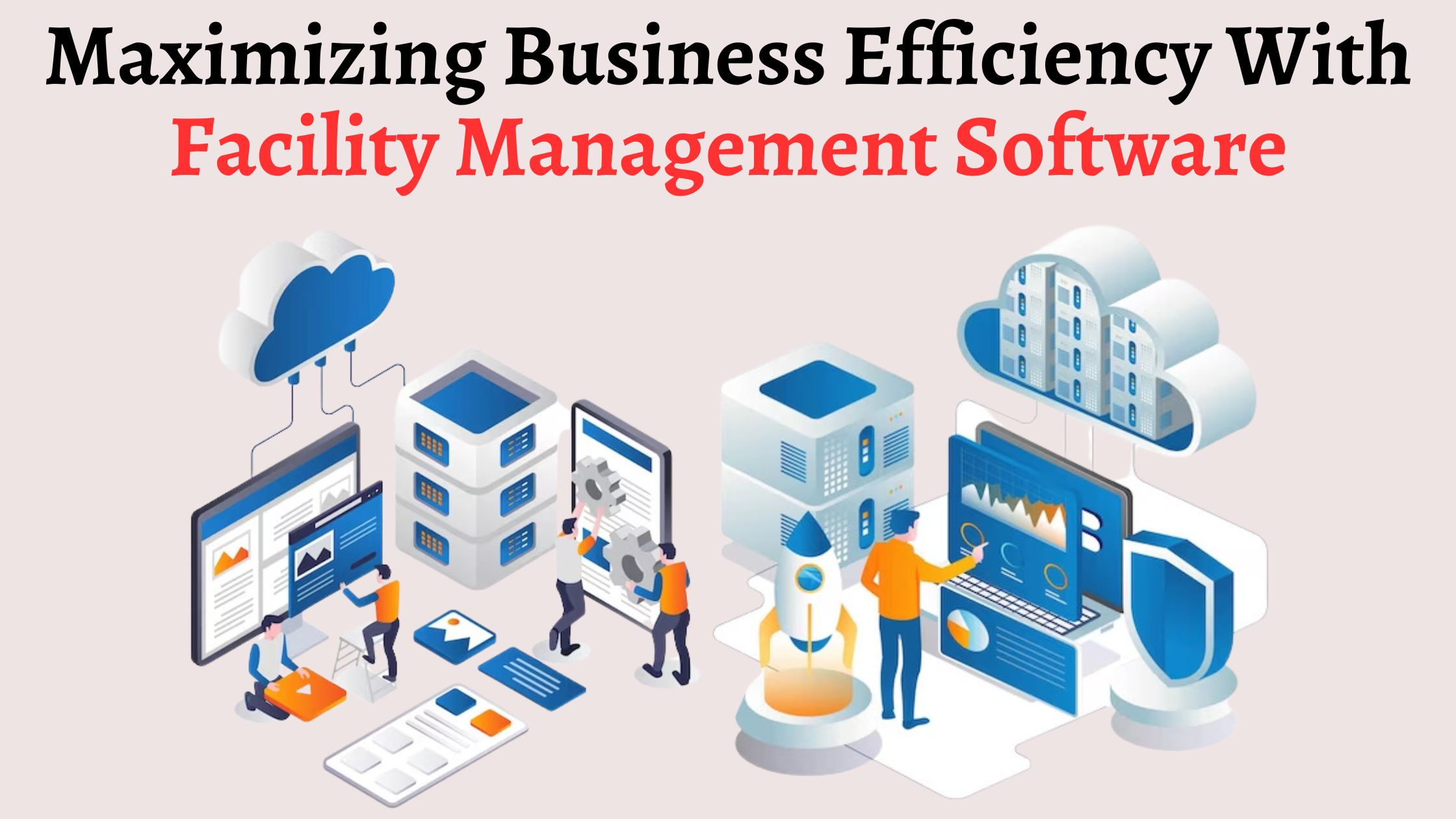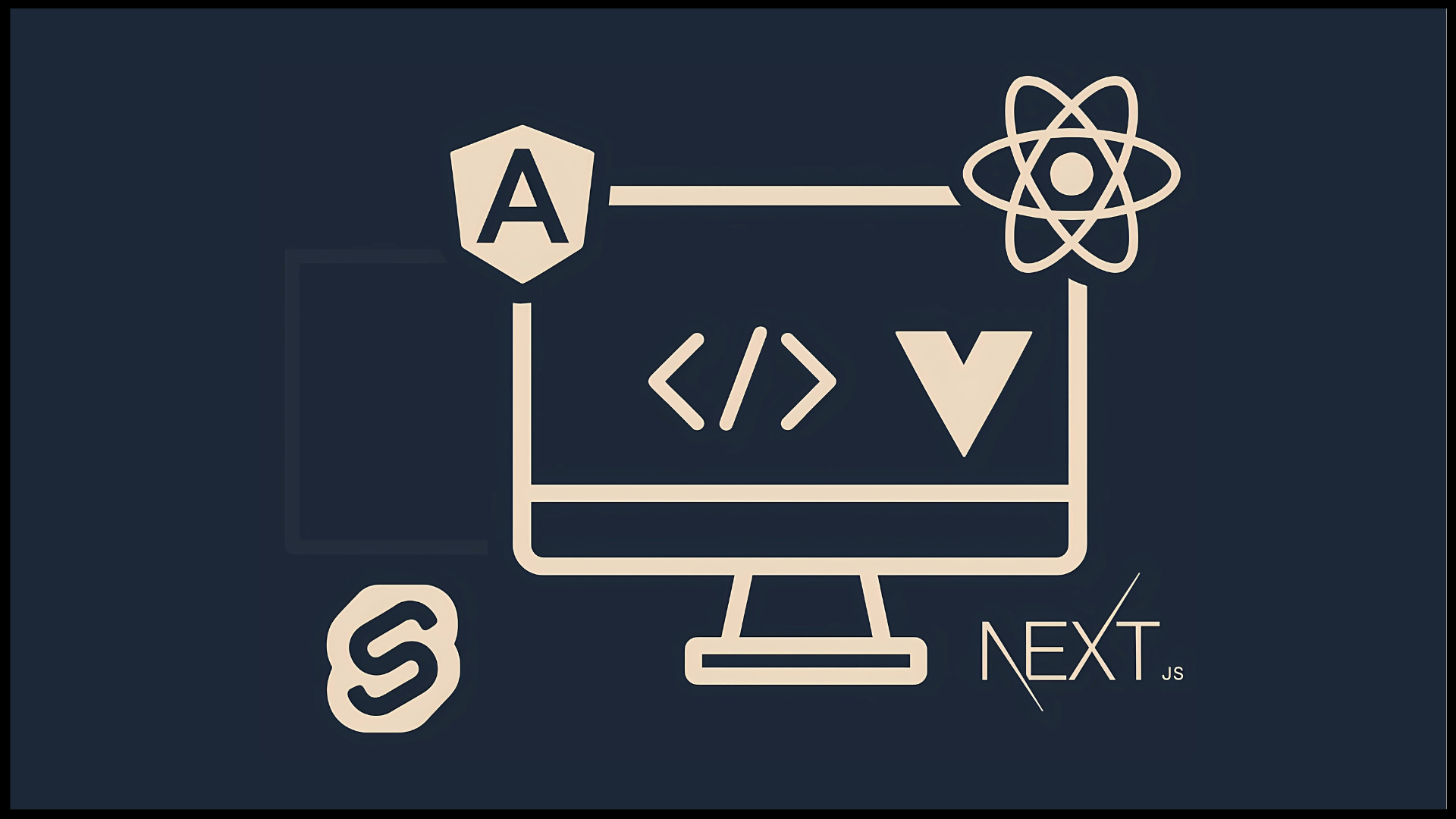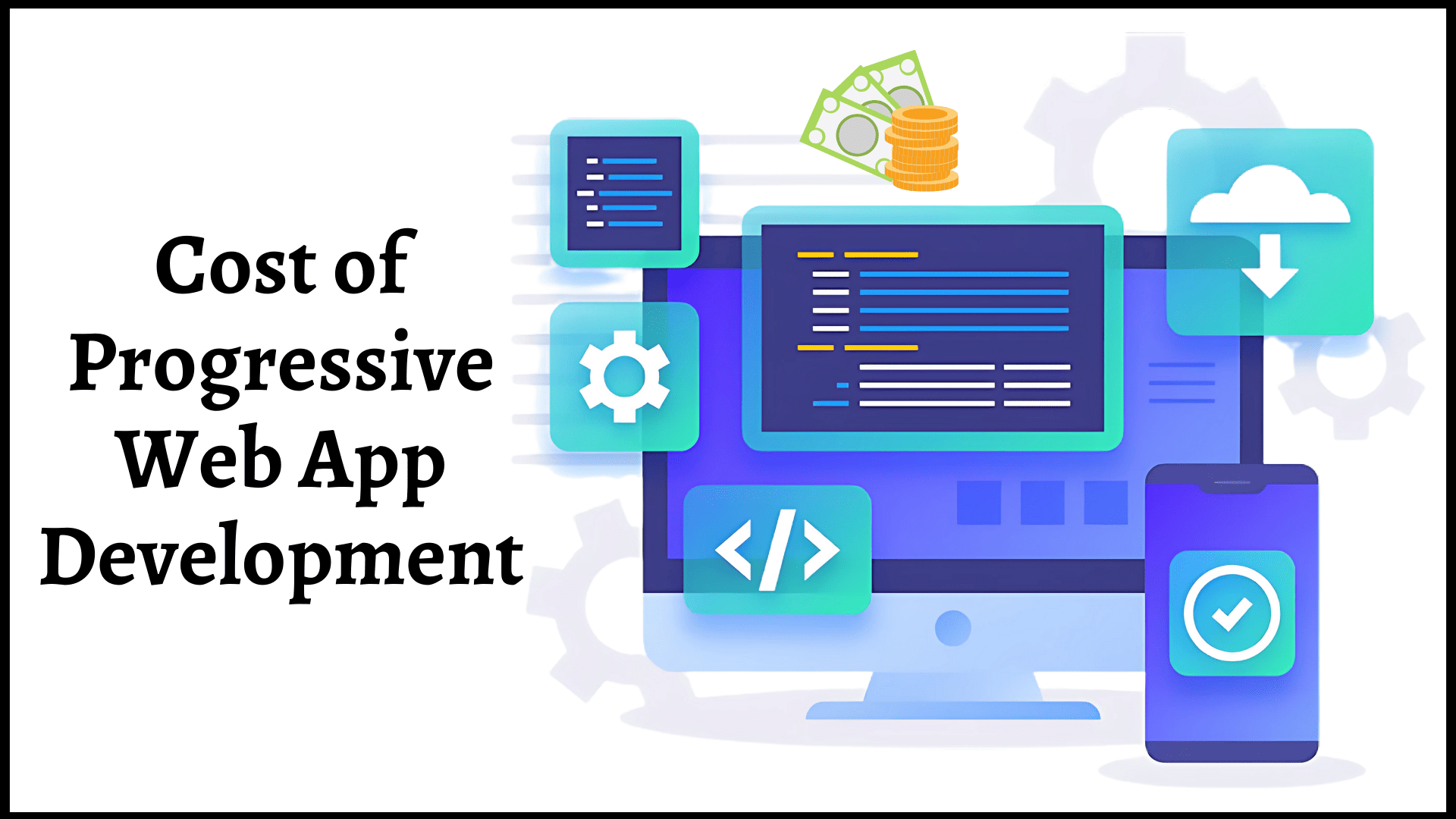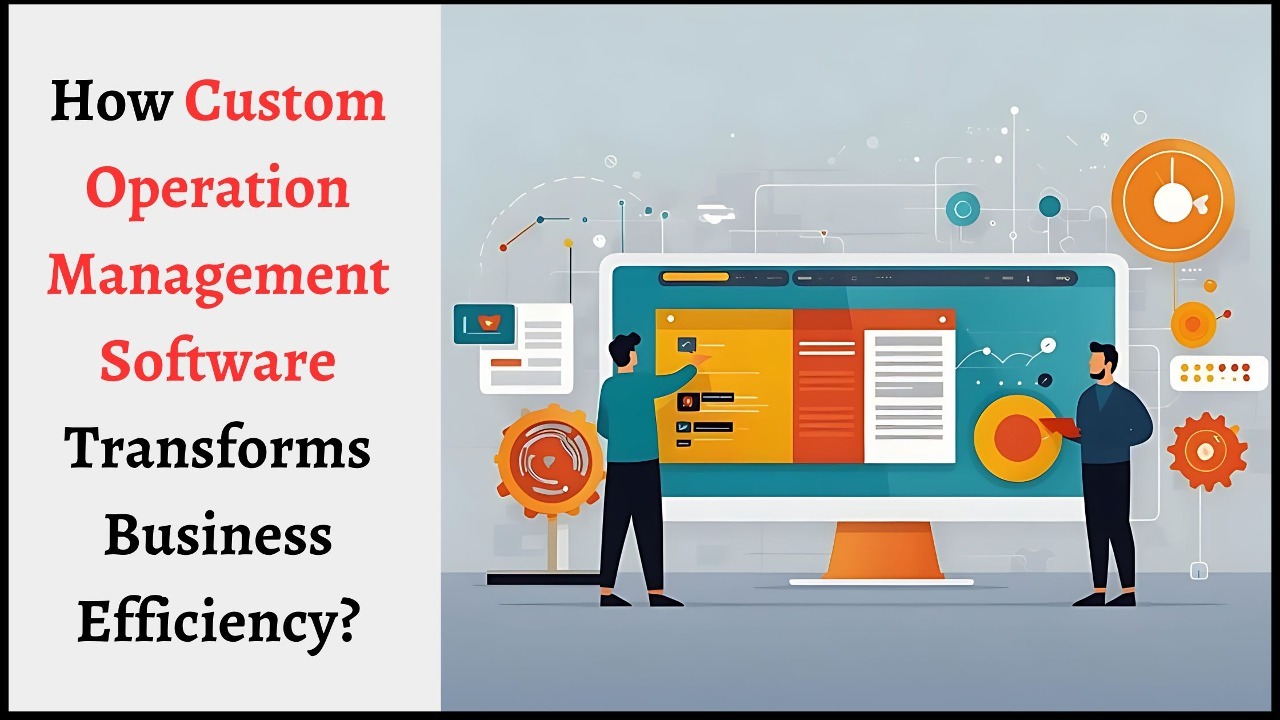- Overview of Facility Management Software
- Benefits of Facility Management Software
- Types of Facility Management Software
- Features of Facility Management Software
- How to Choose the Right Facility Management Software?
- Why Implement Facility Management Software?
- Utilizing FMS in the Industry
- Custom Facility Management Software vs. Off-the-Shelf Solutions
- How to Implement Facility Management Software?
- How Much Does Facility Management Software Cost?
- How Can CSSChopper Help You in Custom Software Development?
The current business landscape is complex and competitive. Now, almost every organization focuses on developing powerful infrastructure for sustainable growth. But, in this relentless pursuit, one crucial aspect often gets overlooked is the facility. This makes management of resources inefficient and creates maintenance challenges for a business.
Think of it like the engine room of your business. A well-oiled machine where operations and seamless workflow hum in perfect harmony. But managing this intricacy, from maintenance to systematic ordering, demands more than just spreadsheets and sticky notes. This is where developing software that can manage the facilities a business can provide is helpful.
However, developing facility management software requires one to be specialized in the technology. The wise decision is to opt for a custom software development company. This ensures it equally aligns with your project needs and provides an effectively tailored solution for enhanced facility management.
Overview of Facility Management Software
Facility Management Software allows a business to manage its facility space and operations, enabling it to plan, implement, and control all its activities. While using these software types, a business can centralize its data. This allows facility managers (employees in charge of facility management) to monitor and control different operations from a single platform. As a result, it can help an organization streamline its operations and save time, money, and energy
FMS offers a holistic approach to enhance productivity and reduce operational costs. These can be used to manage inventory, optimize energy consumption, and perform other tasks that are related to facility management. Based on the needs of your business, you can create a custom FMS for your business. Investing in a technology partner can be extremely rewarding.
Benefits of Facility Management Software
Gone are the days when businesses grappled with various manual processes like report generation and tasks like that, which has increased the work pressure. These have become a bottleneck for a business in providing efficient facilities.
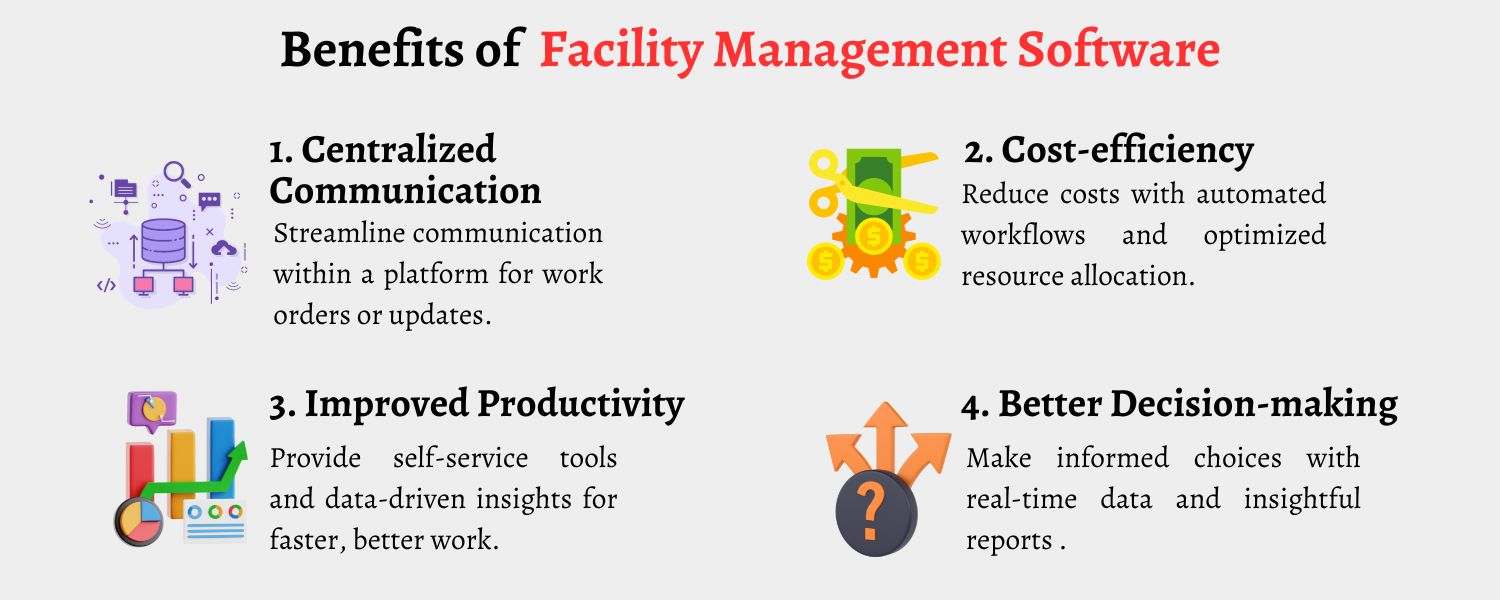
Here, facility management software solves these issues and provides several advantages:
1. Centralized Communication
It facilitates centralized communication and collaboration by providing a platform for sharing information and updates.
2. Cost efficiency
Efficient resource management leads to cost savings by minimizing downtime and optimizing maintenance schedules.
3. Improved Productivity
Facility Management Software is helpful in predictive maintenance and streamlined processes. This ultimately contributes to enhancing productivity.
4. Better Decision-Making
An FMS can help improve decision-making by providing access to real-time data. This allows you to make informed decisions based on the data, which can improve overall efficiency.
Types of Facility Management Software
Your business is different, and the decision to integrate FMS should not be dictated solely by the choices of other service providers. This requires an in-depth assessment of your business requirements. It helps you leverage software that can enhance the operational efficiency of your business in a way that precisely matches the goals of your organization.
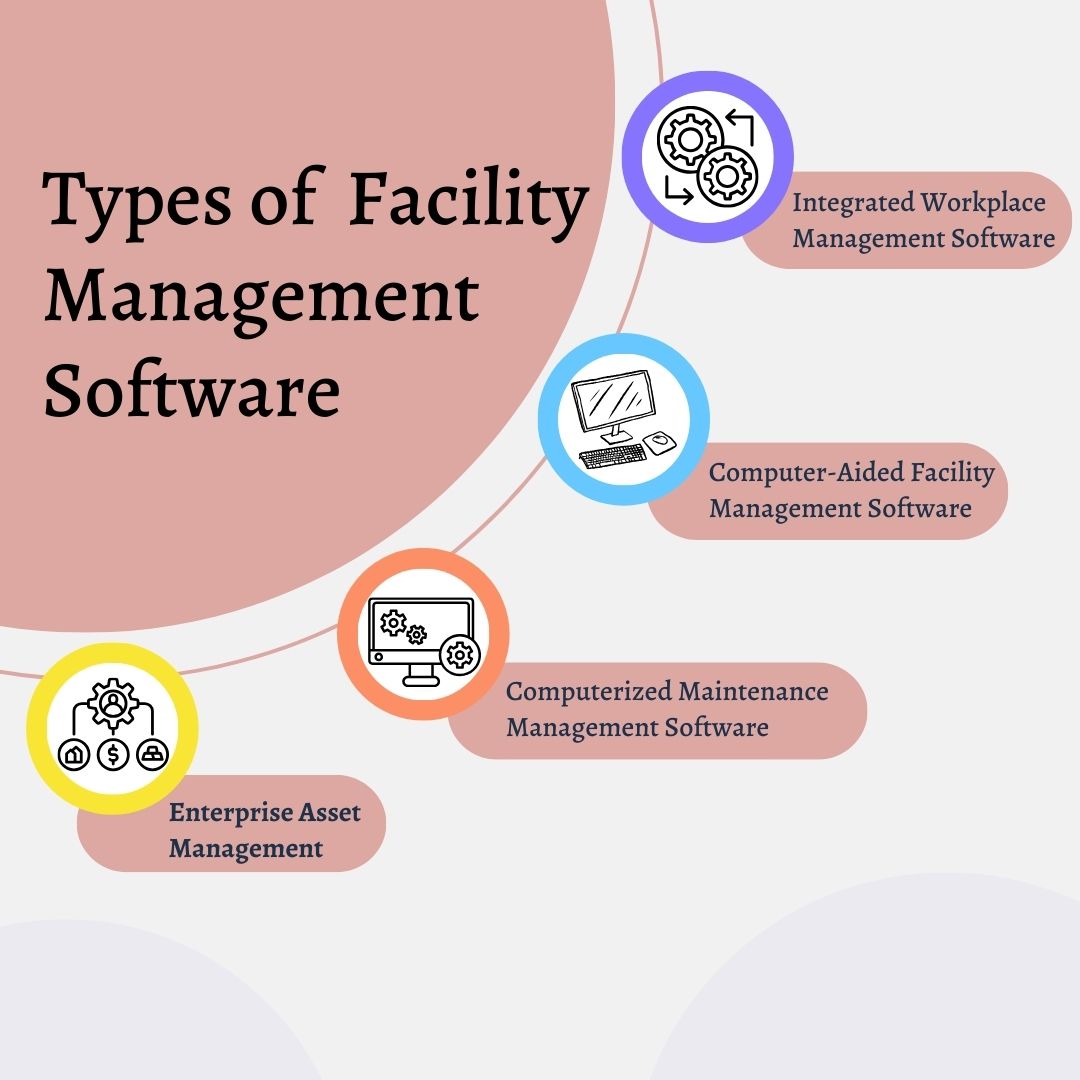
There are various other facility management software that you can opt for your business. Hence, obtaining an idea about this can help you select the right FMS:
1. Integrated Workplace Management Software
Integrated workplace management software is mainly concerned with the people and operations within the facility, and it optimizes workplace resources and property management processes efficiently.
This can help you analyze and increase the functionality of the assets and resources of your organization. It can be extremely beneficial to property managers who want to manage their entire infrastructure and assets from a common software platform.
IWMS can offer the following functionalities:
- Management of the Project
- Property and Lease Management
- Asset and Maintenance Management
- Scheduling Maintenance Management
2. Computer-Aided Facility Management
This software type mainly deals with all the facilities that are helpful in controlling daily operations. It focuses on coordinating with people and organizations to make operations more efficient.
These can offer various administrative capabilities to a facility manager, from planning to execution of activities that are usually related to maintenance within the location of a business. They can include the following functionalities:
- Asset Management
- Space Management
- Room Reservations
- Maintenance Management
3. Computerized Maintenance Management System
These are somewhat similar to CAFM software types. However, they have an in-depth focus on the scheduling, tracking, maintenance, and repair functions of the company. It can strengthen communication between managers and service providers.
Hence, this results in improving the bottom line. Computerized Maintenance Management Systems ensure preventive asset maintenance and thorough lifespan monitoring.
This type of software includes the following functionalities
- Building Space Management
- Equipment and Asset Management
- Automated Maintenance Scheduling
- Reporting and Analysis
4. Enterprise Asset Management
Enterprise Asset Management is a software suite, systems, and services that are required to maintain and control operational equipment. It focuses on optimizing the quality and utilization of assets while increasing productivity and reducing operating costs.
It involves
- Work management
- Supply chain management
- EHS initiatives
Features of Facility Management Software
An FMS is integrated with various features that define its capability. In the present environment, facility management tools are becoming more innovative, integrated, and advanced with additional features.
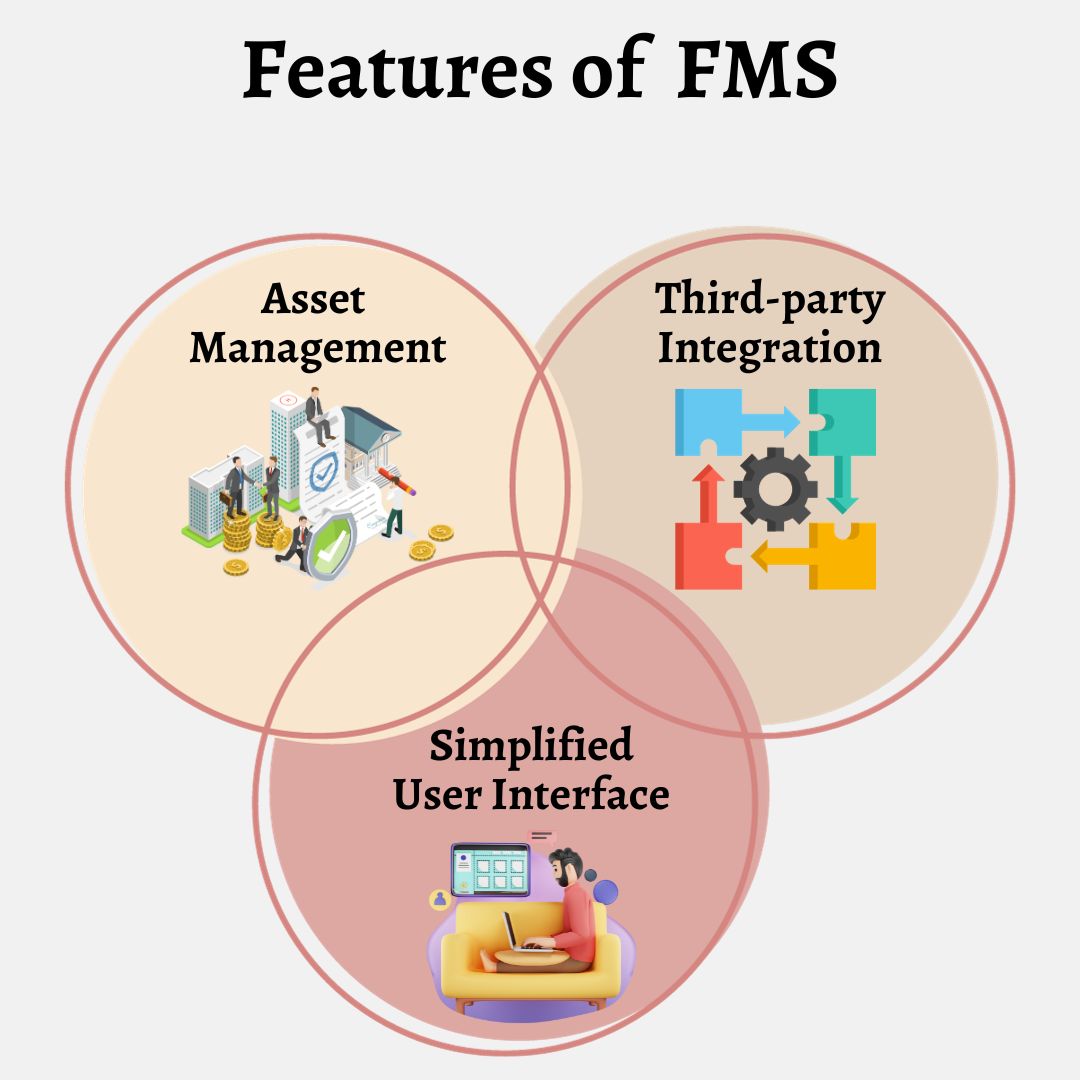
Here are a few features you must know while leveraging these tools in your business operations.
1. Asset Management
These tools simplify work order management in the facility. It gives options to track orders on a monthly, quarterly, or yearly basis. This simplified way of tracking the information about orders helps facility managers to effectively evaluate the areas of improvement.
2. Third-party Integration
A good facility management software allows seamless integration of third-party services. These services include the integration of accounting management with payment gateways to minimize data input errors and automate payment.
3. Simplified User Interface
One of the features of this technology type is its simple user interface. An FMS dashboard must offer a clean, simple, and modern user interface. A simplified user interface reduces clutter in viewing all the required information.
How to Choose the Right Facility Management Software?
Running a business efficiently by ensuring smooth operations to maintain a competitive edge is crucial. One of the ways that a modern business can achieve this is through facility management software. However, choosing the right FMS is a critical decision that requires a proper assessment of your business needs. You can find the right software by considering various factors. These are as follows:
1. Assessing Business Needs
The first step before selecting an FMS for your business is to understand the requirements of your business properly. It is crucial to know which software type suits your business, as their functionality and features differ. You can consider things like
-
Type of Facility
You can obtain an idea about this through the business you are running. For instance, if you are running a real-estate business, then you have to look for software that can help you manage your properties, track your leads, and close deals. If you are running an e-commerce business, then you need software that can help you manage your inventory, process orders, and track your shipping. So, consider choosing software that caters to your specific facility types and challenges.
-
Key Functionalities
While assessing your business needs, do not forget to consider the functionality type you want in your software. Consider prioritizing the functions that are crucial to the operations of your business, like maintenance, asset management, or more. Make a list and include only the necessary features.
2. Scalability and Customization
You will get an idea of which facility management software suits better for your business better after finding the requirements. Now, a solution that is scalable and offers ample room for customization is the best suited for your business. A good facility management software should be scalable to grow with your project and must provide the customizability to adapt to your business.
3. Prioritize User Experience
The ease of use is paramount. When you are looking for the right FMS for your business, prioritize intuitiveness and a user-friendly interface. Also, focus on the following aspects:
- Is mobile access crucial for your field-based teams or remote management? You should ensure that the software offers a stable and feature-rich mobile app.
4. Security
Security is quintessential for a business. Prioritize choosing software that provides enhanced privacy and data encryption measures to protect your data. However, you can also opt for custom software as per the requirements of your business. This requires you to partner with a technology partner to perform the necessary steps.
5. Consider the Budget
Do consider the total cost of ownership and prioritize the required features that can be developed under your budget. Whether you are developing custom software or looking at the available options, be realistic about the amount of money you can spend.
Why Implement Facility Management Software?
If you are running and managing multiple facilities simultaneously, this will be challenging. You have to look at various things that are essential for optimum maintenance, and this will be time and effort-consuming. Here, investing in Facility Management Software can be an esteemed solution for this.
Instead of keeping everything on paper and a checklist, this software type centralizes the information into a single web-based dashboard. All the repetitive tasks are automated, and resources are utilized in a way that delivers facilities at an efficient and productive level.
Utilizing FMS in the Industry
Facility Management Software plays an impactful role in every industry. These are helpful in optimizing and ensuring a smooth workflow of the operations.
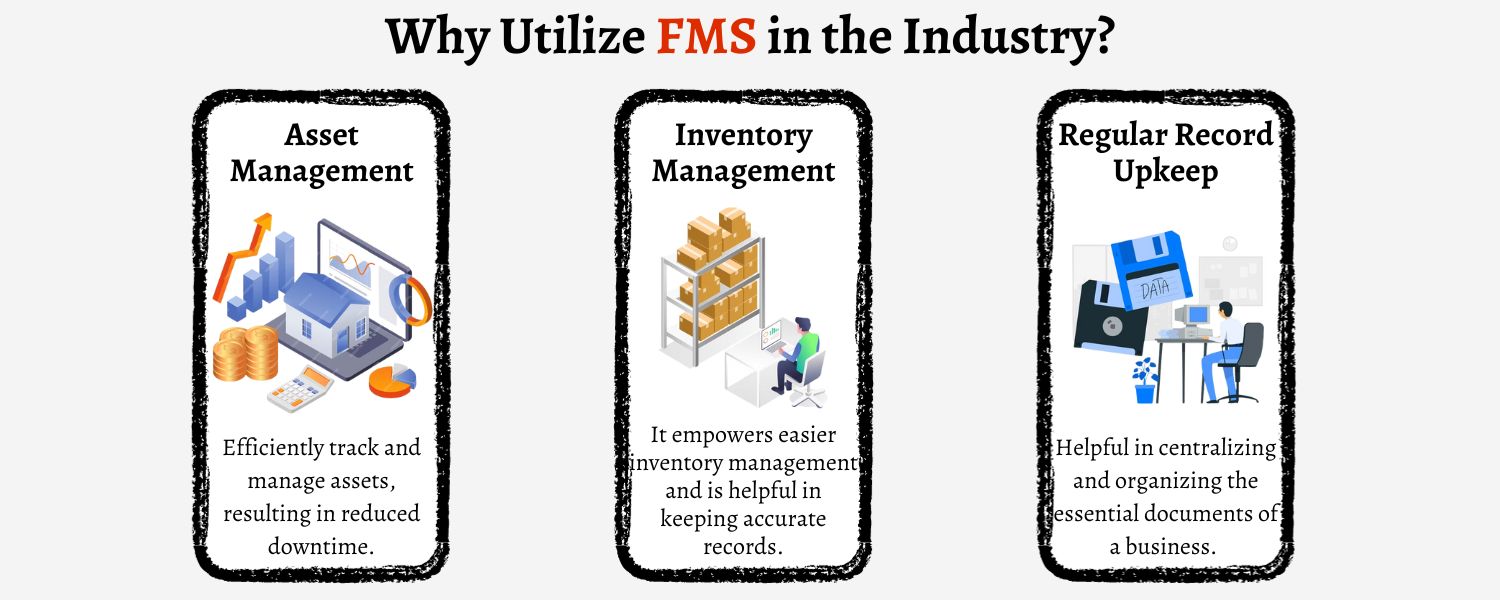
Beyond its primary benefits, there are other ways in which every business/industry can make use of this software type:
-
Asset Management
In the healthcare domain, where precision and efficiency are paramount, the role of Facility Management Software becomes crucial. For a hospital, seamless tracking and management of equipment becomes essential. This software type not only ensures timely maintenance but also effectively reduces downtimes.
-
Utilization of Space
These can be utilized for optimizing the allocation of spaces within the workplace for varied purposes. Also, these softwares play a crucial role in streamlining the process of room booking for programs, like room booking for meetings, events, and medical consultations.
-
Inventory Management
An FMS plays a pivotal role in this aspect. It can help an organization or a healthcare organization maintain a centralized stock of its inventory. This is helpful in keeping medical records accurate and up to date. This provides the facility manager with the required insights to prevent the risk of overstocking or stockouts.
-
Maintenance Scheduling
FMS is helpful in implementing preventive maintenance schedules for critical equipment to minimize disruptions. Not only that, but these ensure compliance with regulatory standards for healthcare facilities.
-
Regular Record Upkeep
FMS is helpful in centralizing and organizing documents. This will ensure easier access to the most important documents when it comes to audits and inspections.
Custom Facility Management Software vs. Off-the-Shelf Solutions
Now that you are aware, FMS can be utilized for varied industries, not just one. You must be looking to use this technology in your industry. But the choice of selecting the right way is still in doubt. Custom facility management software likely requires more budget than the ready-to-use ones. Hence, the choice between custom and off-the-shelf facility management software is a debatable topic.
If you are aware of factors like your budget, specific requirements, and scalability needed, you can make the right choice between them.
| Custom Facility Management Software | Off-the-Shelf Solutions | |
| Cost | Higher development cost but potentially lower long-term cost | Lower upfront costs as expenses are shared among various users |
| Tailored Functionality | Custom solutions are designed to meet the specific requirements of a business. | Not that much customizability is available. |
| Scalability | Can be scaled with the growing needs of an industry | Provides optimum scalability. |
| Development Time | Generally requires a longer time period | Ideally, it can be quickly implemented |
How to Implement Facility Management Software?
Implementing facility management software is not just a one-day task, you need a proper roadmap to get it done. You have to research the requirements of your business, like what activities you need in your facility software to perform. How can it guide for better performance and so on.
For the successful implementation of custom software development, you have to follow certain steps that are predominant in the process.
1. Planning
When you are implementing/developing an FMS for your business, it involves some thoughtful steps. If you lack the necessary tech skills, opting for a custom software development company is the right step. However, before reaching this decision, you require proper planning for your project. Prepare a proper outline of the requirements of your business, consider scalability, customizability, and integration with other systems. This step will serve as the foundation for finding the right FMS for your business.
2. Research and Choose a Suitable FMS
Look for Facility Management Software that aligns with the unique needs of your industry. There are various solutions available, and it’s important to select one that can handle the specific challenges. Whether you serve in healthcare, edtech, or real estate, proper research after considering all the prerequisites of your business can help you select the right FMS for your project. You can consider things like
a. Industry specificity
- If you provide healthcare services, you can look for:
-
- Does the custom software comply with HIPPA compliance?
- If you are an edtech business, you can look for
-
- Can the software handle classroom scheduling, resource allocation, and maintenance of educational equipment?
b. Functional Requirements
You can look for
- Word order management
- Preventive maintenance
- Inventory management
3. Training
Provide panoptic training for staff members who will be using the FMS. This step is essential as these individuals will represent your business, and their adeptness in the software is essential. Proper training can make the successful adoption and utilization of the facility management software.
4. Updates
Choose a reputable technology partner that offers ongoing support and regular updates. This ensures that the software you have developed, with their assistance, will stay updated with the latest features and security patches.
How Much Does Facility Management Software Cost?
Every business is different from the others based on the way they operate, goals, and requirements. This makes it quite clear that when you are looking to find how much facility management software costs, you have to know about all the underlying factors that impact its cost.
An FMS developed for a private hospital will cost more than basic software for a local business. The software built for an enterprise encompasses all the advanced features, modern technologies, and constant support. This will cost significantly more than normal software with a basic feature for a startup.
FMS, with an appealing design and basic functionality, can cost anywhere between 15K USD and 75K USD. However, to get a clear idea of the cost, you can discuss your requirements with a custom software development service provider. The experts will guide and consult you through the process.
How Can CSSChopper Help You in Custom Software Development?
Building custom software can be extremely rewarding if you work with a skilled and bespoke software development solution provider. Partnering with CSSChopper can help you in this aspect. We start our process by understanding the specific requirements of your project and preparing further steps based on it.
Our team uses advanced technologies in custom software development to ensure proper workability. Our client-centric web developers work closely on every project with precision and perfection.
We have been in the industry for more than a decade and have served various industries, like healthcare, edtech, real estate, and others. Our agile development methodology, transparent process, and efficiency are the pillars of our work.
Categories
Recent Posts
Popular Posts
- How to Choose a Reliable Offshore Development Partner?
- Transforming Web Development with HTMX’s Declarative Approach for Dynamic UIs
- Why Your Conversion Funnel Needs a Composable Commerce Solution?
- How to Outsource Web Development in 2025: Complete Guide
- What are the Top Web Development Trends for 2025?

